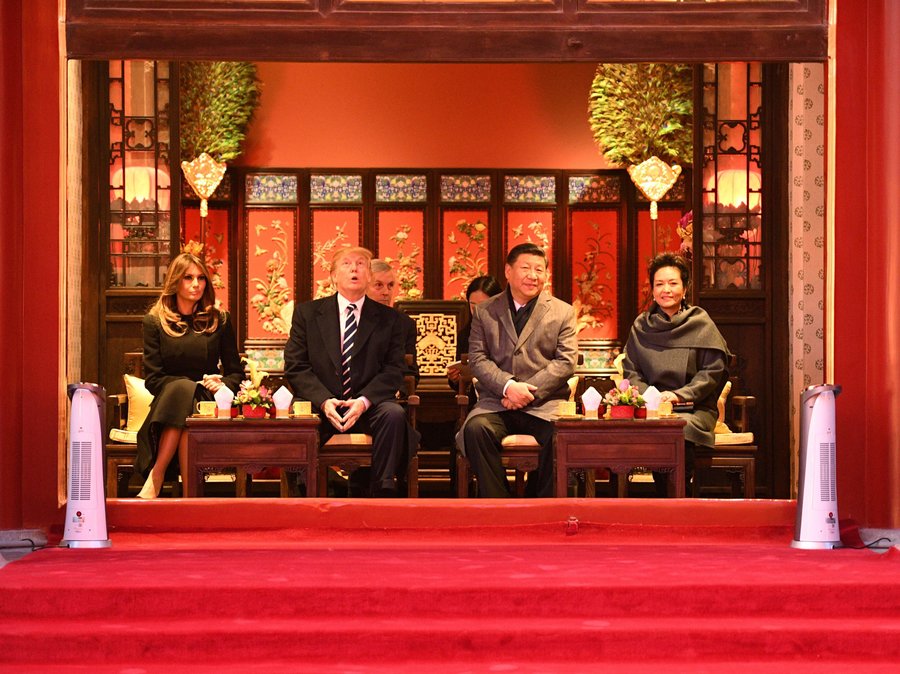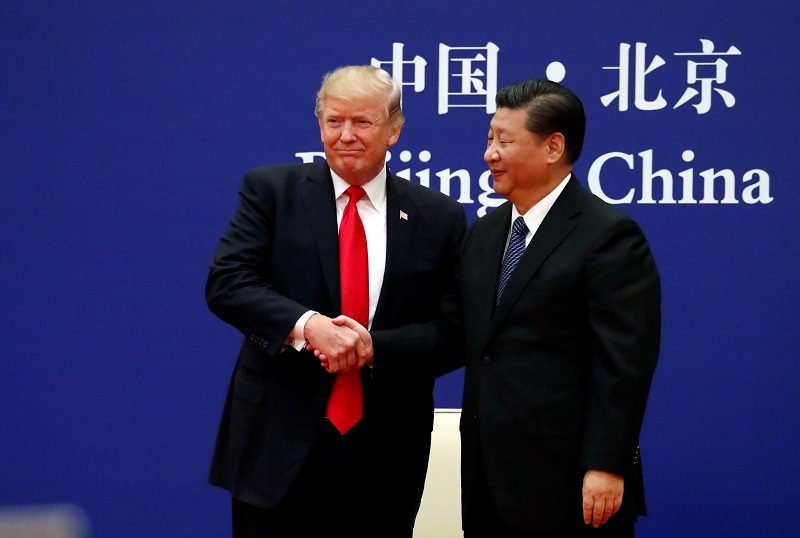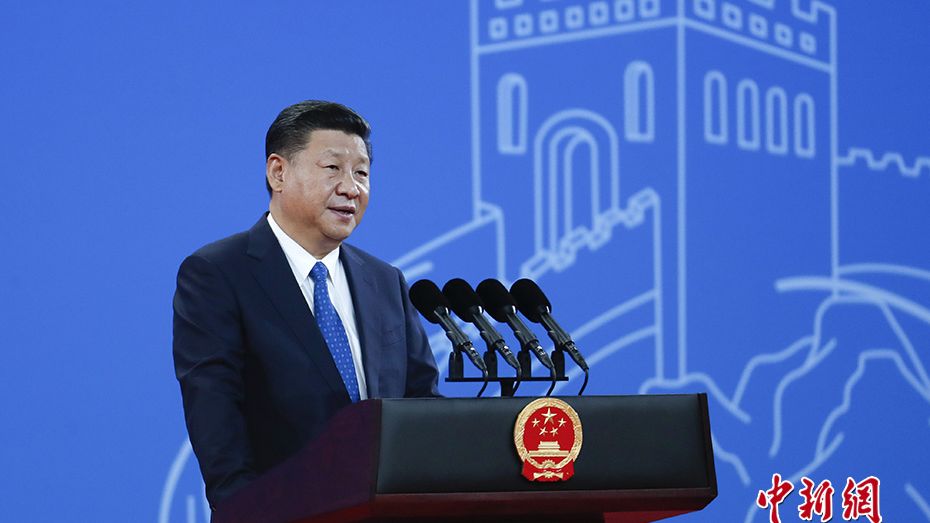
 President Trump Revels in China's State-Visit Red Carpet Treatment
President Trump Revels in China's State-Visit Red Carpet TreatmentPresident Trump departed China after his two night "State Visit-Plus" reception in Beijing. The messages from Chinese state media and President Trump were entirely positive. Trump himself tweeted from Beijing, "In the coming months and years ahead I look forward to building an even STRONGER relationship between the United States and China," and even changed his main Twitter picture twice to photos of himself with Melania, Xi Jinping, and Peng Liyuan. China Daily's headline was a quote from Xi Jinping during the summit in which he declared that China-U.S. relations are "at a new historic starting point."
The lavish welcoming ceremony included a dinner in the Forbidden City, the first time for any foreign leader since the founding of the People's Republic of China. This and the military greeting so impressed Trump that he said, "Nothing you can see is so beautiful," and clearly was a successful tactic of flattering President Trump while in China, and softening the issues of disagreement between the two countries, namely trade and North Korea. Orville Schell, who travelled with the president on his Asia tour commented, "although he and Xi did not seem to take much joy in each other's company (after all, they could not really communicate, since neither speaks a foreign language), Trump definitely seemed gratified by the pomp and circumstance. After all, it heralded and honored him in the kind of unalloyed way he seldom gets to enjoy back home in America. Not only has he gotten the kind of adoration here in Asia that he craves, but in China he is able to enjoy just the kind of 'fake news'-free environment of which he can only dream back in Washington."
The Global Times latched onto Trump's idea of fake news, too, arguing in an op-ed that Trump is generally thought of positively in China, and stating that, "Many leading U.S. media outlets are now discredited among the Chinese public, partly because of their fake reports during the elections and subjective opposition against Trump." As one China-US Focus contributor wrote, this biggest appeal of Trump in China is due to his "frankness," which also checks with a number of people the SCMP interviewed in Beijing before the state visit.
In an email to the editors of China-US Focus, Paul Haenle, director of the Carnegie-Tsinghua Center in Beijing wrote, "What I am beginning to think is that we may end up having a case of misaligned assessments of how this visit has played out. President Xi and the Chinese leadership will think that they have done a lot to give President Trump face, they've done a state visit plus, they've rolled the red carpet out with all the pomp and ceremony. And they did all these business deals and they come away thinking the relationship is on a solid footing. But President Trump may go home to a domestic political environment where people are disappointed he hasn't achieved more progress on the structural trade and economics issues (market access, more fair and reciprocal treatment for US businesses, IPR, forced technology transfer, and Chinese unfair industrial policies) and North Korea, and my concern is you may see a shift towards a much harder line coming from the US Administration. That will be a huge surprise to China and President Xi, especially given that Xi likely feels he has done a lot for Trump on this visit."
 The Weight of a $253 Billion Package
The Weight of a $253 Billion PackageDuring his trip to China this past week, President Trump was accompanied by a number of high profile members of the United States' business community. Emanating from this trip was a roughly $250 billion trade deal, which both leaders characterized as "examples of 'win-win' cooperation between the world's biggest economies." Further, many, such as William Zarit, the chairman of the American Chamber of Commerce in China, called the deal as a sign of "a strong, vibrant bilateral economic relationship" between the two countries. However, Jacob Parker, who helps run China operations at the US-China Business council noted, "The biggest challenge American companies face in China is not the ability to make deals, says Parker, but the ability to ensure these deals are fair."
Part of this issue, in making trade for US companies fair, is fair market access. Addressing this concern, Zheng Zeguang, vice-foreign minister, told reporters on Thursday that "China will sharply ease market access in financial sectors including banking, security funds and insurance, and gradually cut taxes on imported cars, in line with its own timetable and roadmap." It was also noted that although this deal appears to be capable of balancing and enhancing trade, "there were no agreements on giving U.S. companies more access to Chinese markets, or opening up Chinese financial markets." Further, "roughly 15 agreements unveiled on Thursday are mostly non-binding memorandums of understanding and could take years to materialize." To be clear, the deal for China to purchase more Boeing planes is not a new deal, as China tends to buy around 300 new planes every few years.
However, it was not all bland. As U.S. Commerce secretary Wilbur Ross said: "Today's signings are a good example of how we can productively build up our bilateral trade." Trump was able to score a win for U.S. Financial Firms, though he did not realize it was coming. As a result of the talks, "China announced new rules allowing them to own 51 percent stakes in joint ventures."
 Trump and Xi articulate dueling visions at the APEC Summit
Trump and Xi articulate dueling visions at the APEC SummitIn Vietnam again at the same table, Xi and Trump appeared to be in a competition to woo the rest of the world at the APEC summit.
Although both called for global economic engagement, they struck markedly different tones. Trump railed against the World Trade Organization, saying that it "cannot function properly" if all members fail to follow its rules, touted his 'America first' policy, and openly rebuked alleged 'trade abuses' and 'cheating' by China and other global entities. "We can no longer tolerate these chronic trade abuses," Trump said. "From this day forward, we will compete on a fair and equal basis," he added. "We are not going to let the United States be taken advantage of anymore. I am always going to put America first the same way that I expect all of you in this room to put your countries first." Accordingly, he noted that the U.S. would not be seeking multilateral trade deals.
Meanwhile, multilateralism was front and center in President Xi Jinping's speech as he extolled "the value of international 'cooperation' and economic 'openness.'" Said Xi, "The building of an Asia Pacific free-trade era is a long-cherished dream of the business community of our region. This is a new journey for greater integration with the world." His tone and narrative struck a stark contrast to Trump's isolationist rhetoric – rhetoric which has become increasingly worrisome to other Asia Pacific economies, including Vietnam which hosted this year's summit.
The dueling narratives at APEC appear to follow with broader ideological – and geopolitical – shifts which have become deeply pronounced under the Trump administration. Many analysts have noted that, as America increasingly turns inward, China has amplified its global stature and reach. According to the Washington Post's Brian Klaas, who was traveling during Trump's visit, "Here in Bangkok, it's striking how everyone I talk to — from generals in the country's ruling military junta to even the most liberal-minded political party leaders — says the same thing off the record: China is the new power. Trump's America is waning. And we can extract what we need from him using flattery without giving up anything meaningful."
Prepared by China-US Focus editorial teams in Hong Kong and New York, this weekly newsletter offers you snap shots of latest trends and developments emerging from China every week, while adding a dose of historical perspective.
- 2017-11-03 Will China Display Hard or Soft Power in the Era of Xi?
- 2017-10-27 All Eyes on Xi
- 2017-10-20 The 19th Party Congress Begins
- 2017-10-13 Tech Titans
- 2017-10-06 China’s Super Golden Week
- 2017-09-29 All Quiet on North Korea’s Western Front?
- 2017-09-22 Back Together and Better than Ever: Renewed Sino-Russian Relations
- 2017-09-15 China positions itself to dominate the industries of the future
- 2017-09-08 Did North Korea just test a hydrogen bomb?
- 2017-09-01 Are Forced Technology Transfers Forcing the U.S. and China to Rethink How They Do Business?
- 2017-08-25 Bannon Out: What now for the China-US relationship?
- 2017-08-18 Trump Launches “Investigation on Whether to Investigate” China’s IP Laws
- 2017-08-11 Threats of "Fire and Fury" on the Korean Peninsula
- 2017-08-04 Trump Administration Plans Trade Actions Against China
- 2017-07-28 Xi to Dominate the 19th CPC Congress
- 2017-07-21 A Steely Comprehensive Economic Dialogue
- 2017-07-14 South China Sea Arbitral Award after One Year
- 2017-07-07 Now is the Trump Honeymoon with China Over?
- 2017-06-30 China Passes New Intelligence Law
- 2017-06-23 The End of China’s Honeymoon with Trump & Diplomatic and Security Dialogue